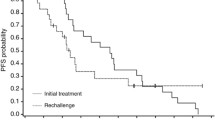Abstract
Targeted agents sunitinib and temsirolimus are effective in advanced renal cell carcinoma. Treatment algorithms for single-agent use have been proposed in order to optimize timing and type of therapy. The aim of this study was to investigate the tolerability and adverse event profile of patients who received sunitinib and temsirolimus in sequence. We performed a retrospective analysis of patients with advanced renal cell carcinoma who received temsirolimus after disease progression under sunitinib therapy. Dosages of both drugs were in accordance with the recommendations given by the respective manufacturers. Temsirolimus was provided before its official approval within a compassionate use program. Adverse event assessment followed the National Cancer Institute Common Toxicity Criteria. Thirteen patients receiving temsirolimus after progression under sunitinib were identified. Overall treatment time with targeted drugs (sunitinib/temsirolimus) was 34.8 (17–78) weeks, treatment with sunitinib was 28.6 (12–72), and with temsirolimus 6.2 (2–16) weeks, respectively, whereas mean therapy interruption time between both approaches was 4.4 (2–12) weeks. Under sunitinib, we observed 52 transient adverse events, 49 (94.2%) were of grade I/II, whereas 3 (5.8%) were of grade III. Under temsirolimus 36 adverse events, only grade I/II in nature were remarked. Sequential use of temsirolimus after progression under sunitinib seems to be feasible and results in a predictable, medically manageable side effect profile. Further evaluation is necessary to define the oncological validity of this sequencing approach.
Similar content being viewed by others
Abbreviations
- mTOR:
-
Mammalian target of rapamycin
- mRCC:
-
Metastatic renal cell carcinoma
- TKI:
-
Tyrosine kinase inhibitor
- EMEA:
-
European Medicines Agency
- CHMP:
-
Committee for medicinal products for human use
- CUP:
-
Compassionate use program
- RECIST:
-
Response evaluation criteria in solid tumors
- MSKCC:
-
Memorial Sloan-Kettering Cancer Center
- NCICTC:
-
National Cancer Institute Common Toxicity Criteria
- IFN-α:
-
Interferon alpha
References
Jemal A, et al. Cancer statistics 2007. CA Cancer J Clin. 2007;57(1):43–66. doi:10.3322/canjclin.57.1.43.
Ljungberg B, et al. European Association of Urology Guideline Group for renal cell carcinoma. Renal cell carcinoma guideline. Eur Urol. 2007;51(6):1502–10. doi:10.1016/j.eururo.2007.03.035.
Motzer RJ, et al. Sunitinib versus interferon alfa in metastatic renal-cell carcinoma. N Engl J Med. 2007;356(2):115–24. doi:10.1056/NEJMoa065044.
Escudier B, et al. Sorafenib in advanced clear-cell renal-cell carcinoma. N Engl J Med. 2007;356(2):125–34. doi:10.1056/NEJMoa060655.
Motzer RJ, et al. Survival and prognostic stratification of 670 patients with advanced renal cell carcinoma. J Clin Oncol. 1999;17(8):2530–40.
Hudes G, et al. Temsirolimus, interferon alfa, or both for advanced renal-cell carcinoma. N Engl J Med. 2007;356(22):2271–81. doi:10.1056/NEJMoa066838.
Otto T, Eimer C, Gerullis H. Temsirolimus in renal cell carcinoma. Transplant Proc. 2008;40(10 Suppl):S36–9. doi:10.1016/j.transproceed.2008.10.006.
Gerullis H, Bergmann L, Maute L, Eimer C, Otto T. Experiences and practical conclusions concerning temsirolimus use and adverse event management in advanced renal cell carcinoma within a compassionate use program in Germany. Cancer Chemother Pharmacol. 2009;63(6):1097–102. doi:10.1007/s00280-008-0835-2.
Torisel [Package Insert]. Philadelphia, PA: Wyeth Pharmaceuticals, Inc.; 2007.
de Reijke TM, Bellmunt J, van Poppel H, Marreaud S, Aapro M. EORTC-GU group expert opinion on metastatic renal cell cancer. Eur J Cancer. 2009;45(5):765–73. doi:10.1016/j.ejca.2008.12.010.
Rini BI et al. CALGB 90206. A Phase III trial of bevacizumab plus interferon-alpha versus interferon-alpha monotherapy in metastatic renal cell carcinoma. ASCO Genitourinary Cancers Symposium 2008; Abstract 5033.
Motzer RJ, et al. Efficacy of everolimus in advanced renal cell carcinoma: a double-blind, randomised, placebo-controlled phase III trial. Lancet. 2008;372(9637):449–56. doi:10.1016/S0140-6736(08)61039-9.
Escudier B, et al. Bevacizumab plus interferon alfa-2a for treatment of metastatic renal cell carcinoma: a randomised, double-blind phase III trial. Lancet. 2007;370(9605):2103–11. doi:10.1016/S0140-6736(07)61904-7.
Bellmunt J, Guix M. The medical management of metastatic renal cell carcinoma: integrating new guidelines and recommendations. BJU Int. 2009;103(5):572–7. doi:10.1111/j.1464-410X.2008.08336.x.
Eichelberg C, et al. Sequential use of the tyrosine kinase inhibitors sorafenib and sunitinib in metastatic renal cell carcinoma: a retrospective outcome analysis. Eur Urol. 2008;54(6):1373–8. doi:10.1016/j.eururo.2008.07.051.
Bhojani N, et al. Toxicities associated with the administration of sorafenib, sunitinib, and temsirolimus and their management in patients with metastatic renal cell carcinoma. Eur Urol. 2008;53(5):917–30. doi:10.1016/j.eururo.2007.11.037.
Tamaskar I, et al. Antitumor effects of sunitinib or sorafenib in patients with metastatic renal cell carcinoma who received prior antiangiogenic therapy. J Urol. 2008;179(1):81–6. doi:10.1016/j.juro.2007.08.127.
Patel PH, Senico PL, Curiel RE, Motzer RJ. Phase I study combining treatment with temsirolimus and sunitinib malate in patients with advanced renal cell carcinoma. Clin Genitourin Cancer. 2009;7(1):24–7.
Author information
Authors and Affiliations
Corresponding author
Rights and permissions
About this article
Cite this article
Gerullis, H., Bergmann, L., Maute, L. et al. Feasibility of sequential use of sunitinib and temsirolimus in advanced renal cell carcinoma. Med Oncol 27, 373–378 (2010). https://doi.org/10.1007/s12032-009-9220-1
Received:
Accepted:
Published:
Issue Date:
DOI: https://doi.org/10.1007/s12032-009-9220-1




